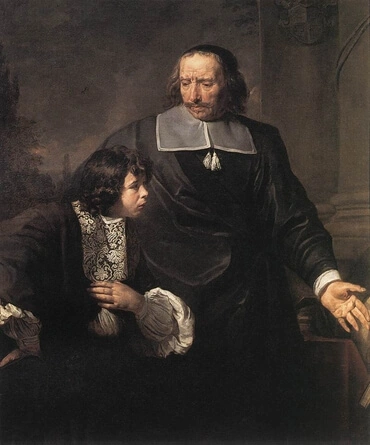Arcana Coelestia # 3103
3103. 'And the man took a gold nose-jewel' means Divine Good. This is clear from the meaning of 'a gold nose-jewel' as good, and here, since the Lord is the subject in the internal sense, as Divine Good, which, since it comes from the Rational, is called 'the man'. For 'a man' means the rational, see 265, 749, 1007. In ancient times when forms of worship in Churches were representative and people knew what those forms meant, it was customary when initiating marriages to give a gold nose-jewel and bracelets to the bride because the Church was represented by the bride, its good by 'the nose-jewel' and its truth by 'the bracelets'. They did so because it was well known that conjugial love as it existed with a bride and wife came down from the marriage of the Lord's Divine Good and Divine Truth, see 2508, 2618, 2727-2729. The gold jewel was placed on the nose, as is evident also from where it is said later on that the servant put the jewel on her nose, verse 47, because 'the nose' meant the life of good. It had this meaning because the nose is used for breathing, which in the internal sense means life, and also for smelling, which means the delight of love, namely good, 96, 97.
[2] As regards 'a nose-jewel' being a sign of the good involved in marriage, this is also clear from other places in the Word, as in Ezekiel,
I adorned you with ornaments and put bracelets on your hands and a chain on your neck, and I put a jewel on your nose. Ezekiel 16:11-12.
This refers to the Ancient Church, meant by Jerusalem here and described as a bride to whom bracelets, a chain, and a nose-jewel were given. 'Bracelets on the hands' were a representative sign of truth, 'a jewel on the nose' a representative sign of good. In Isaiah,
Because the daughters of Zion are haughty the Lord will make bald the crown of their heads, and will take away the rings and the nose-jewels, the changes of clothes, the robes. Isaiah 3:16-18, 21-22.
'The daughters of Zion that are haughty' stands for affections for evil within the Church, 2362, 3024. 'The rings and the nose-jewels' that will be removed stands for good and the signs of it. 'The changes of clothes' and 'the robes' stand for truth and the signs of it. In Hosea,
I will visit on her the days of the baals to whom she burned incense and decked herself with her nose-jewel and her other jewellery and went after her lovers. Hosea 2:13.
This refers to the perverted Church and to the new one following it. 'Nose-jewel' also stands for a sign of the good of the Church. When those jewels were fitted to the ears they again meant good, though good put into practice, and in the contrary sense evil put into practice, as in Genesis 35:4; Exodus 32:2, 4.
Man (male)

The relationship between men and women is deep and nuanced, and one entire book of the Writings -- Conjugial Love -- is devoted to the subject. So we can hardly offer a full explanation here. In a very general sense, though, the Writings say that men are creatures of intellect, driven by the love of growing wise; women, meanwhile are creations of affection, driven by the love of wisdom and the good that wisdom can do. They are formed this way to reflect the Lord's Divine Love and Divine Wisdom, and so that they can form marriages that reflect the unity of Divine Love and Divine Wisdom. Marking differences between men and women can be a touchy thing, but realistically it's easy to see that men tend to love acquiring knowledge whether it has any practical application or not. Many of them can spout out sports statistics or hold court on the workings of the internal combustion engine, even though it is knowledge they are not likely to ever use. They find such knowledge interesting for its own sake. It follows, then, that when the Bible speaks of men, the men represent facts, ideas, knowledge, truth, intellect and wisdom -- or in the negative sense falsity, twisted logic, and reasoning that is devoid of concern for others.






